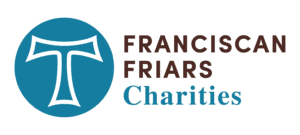
The school bus doors fan open outside the nearly three-quarters-of-a-century Franciscan soup kitchen in San Francisco’s Tenderloin, a neighborhood where one-third of the population is locked in the clutches of poverty. The youthful exuberance of the 25 high school students who pour onto the sidewalk is contagious. But this isn’t your typical field trip.
The day will offer many life lessons – empathy, social responsibility, community, care for all creation. Things the students won’t find in their math textbook, science class, or technology lab. Today’s lessons will be learned at the St. Anthony Foundation dining room – where friars and volunteers feed hundreds of homeless, poor and hungry guests every day – and in the free clothing and addiction recovery programs.
The teens are from a Catholic school in San Mateo, one of a dozen Bay Area Catholic high schools that rotate small groups of students four days a week to the St. Anthony Foundation to connect them with a community that society generally finds easier to ignore than embrace. It is more than a feel-good day of service, says Antonio Luevano, OFM, who coordinates the program.
“This is more than just serving meals and handing out clothes. It’s mission-driven – an experience of encounter rooted in Franciscan values and spirituality that connects community, gratitude, social justice and healing,” explained Antonio, who joined the friars eight years ago.

“Young people are our next wave of citizens,leaders and Catholics. Engaging them with these social realities helps them experience their faith and classroom learning in a very tangible way. It’s an expression of faith in action – applying and experiencing gratitude, social justice, and what it means to serve in community.”
Antonio starts the day with an orientation talk about mission, service, and St. Francis of Assisi’s remarkable life of caring for the poor. The students are then separated into two groups – one assigned to the clothing boutique, where they sort through and display apparel on racks and assist guests in finding what they need. The other group is assigned to the dining room to work the buffet-style line, bus tables, and deliver meals to disabled guests.
“We want them to recognize the small acts of justice – giving guests the dignity of choosing their clothes and the food they enjoy,” said Antonio.
One student’s assessment of the day: “I came here thinking I was going to be the one serving, but I got so much more in return. A lady was so happy that I found her size and favorite color sweater. I think I was happier than she was.”
The centerpiece of the dining room experience is the privileged encounter – the guests inviting the students into their lives with the stories they share.
“There is a humanness, a caring for one another, when the students sit with guests. It demystifies homelessness and poverty. They realize that people weren’t always without shelter, or always poor. They acknowledge the different circumstances that got them there. They learn that guests are ordinary people who have dreams, interests, successes and failures just like everyone else,” said Antonio.
One student, fluent in Mandarin, joined a guest for lunch. She mentioned languages she was studying in school. The guest said he studied French in high school, but learned five other languages from riding the bus and people he meets. She was skeptical – until he started speaking to her in Mandarin! She realized she gave community to a person who just came there for a hot meal.
The teens attend Mass at St. Boniface Church, which is open several hours a day for unsheltered guests to rest. At the end of the day, they return to the orientation room for an opportunity to process their experiences. “They are excited to share conversations and encounters, and how they experienced and witnessed gratitude and justice. We encourage them to continue the conversation at home,” said Antonio.
The day concludes with different guest speakers from the Foundation’s Father Alfred Center – a 12-month residential addiction recovery program for men – who provide frank and honest testimony about their addiction and recovery.
“I was shot when I was 9-years-old,” begins today’s guest speaker. “My friends thought it was cool. But I almost died. Instead of using the second chance, I got into crime and drugs. My mother died when I was in prison. I never got to say goodbye.”

Rick Phillip, OFM, chaplain at the Father Alfred Center who joined the Franciscans seven years ago, says the students are witnessing real conversion. “Standing in front of a group of young people and sharing their personal story is a big part of the healing process for these men in recovery. It’s eye-opening for the students to hear about the suffering and devastation of addiction, and very emotional for the men.”
The impact of this mission experience is seen in the sustained involvement of students who return with a parent to volunteer on a Saturday or day off – and in clothing drives they organize in their communities. The teens realize they can’t change things in a one-day visit, but they know that St. Anthony Foundation is a place that puts a meal on the table and provides clothing, medical care, job training, addiction recovery – and, most importantly, hope, love and encouragement.
Content for this article compiled and written by Steve Mangione.
Photos courtesy of Antonio Luevano, OFM, and the St. Anthony Foundation web page.

